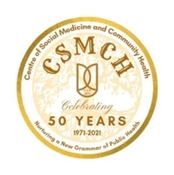
Celebrating 50 Years of
Centre of Social Medicine and Community Health
CSMCH JNU YouTube
Alumni Networking Group
The Foundation Day Celebration
Curtain Raiser Event by Dr. Imrana Qadeer
Morning session of the Foundation Day
Evening Session of the Foundation Day
Webinar Series
Interdisciplinary Public Health in the 21st Century
Epidemiology and the Social Sciences
The Politics of Knowledge and Integrative Health Systems
Pedagogy of Interdisciplinary Public Health
Paradigms in Health Systems Research and Policy Studies














